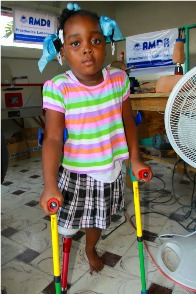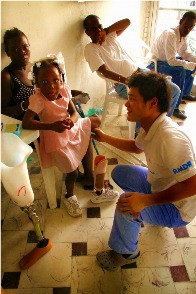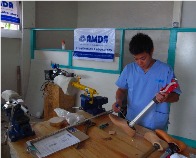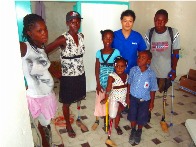Subject: Fundraising Request - Education Sponsorship
Date: Tue, 8 Feb 2011 21:03:16 +0000
X-OriginalArrivalTime: 08 Feb 2011 21:03:16.0928 (UTC) Hi everyone,
My good friend in Prey Veng, Mr Hour has brought to my attention a situation with one of the girls in the Supportive Home he runs for women with disabilities. Ka Lek (profile attached) is currently in second year university at the Chea Sim University of Kamchey Mear (CSUK) which is located in Prey Veng town. She is studying Accounting - a valuable degree which can vastly improve her future and help her to gain independence. Recently her father passed away and her sister's husband took a second wife and has abanoned Ka Lek's sister with her two children. Ke Lek's mother is now responsible for her abandoned daughter and grandchildren. Unfortunately the sister recently also passed away - leaving Ka Lek's mother the soul provider for her two grandchildren. Ka Lek's mother can no longer support Ka Lek's university fees and Ka Lek will need to drop out if she can not find sponsorship.
It is a huge achievement for Ka Lek to be going to University, it is very unusual for people with disabilities to be given the chance to go to High School, let alone be given a University education so Ka Lek has achieved a lot to get this far.
FDCC and Rose Charities are operating the Mekhala Education Sponsorship program which sponsors two students to complete their University education each year. We are able to manage Ka Lek's sponsorship through this program - we just need the funds to do so!
Ka Lek requires funds for three years more of study to complete her Accounting degree, that's approximately USD$250-350 per year.
Please let me know if you can help in any way. Please remember too that the funds aren't required until October each year so if you are able to organise a fundraiser - there is time!
Thanks very much,
Sarah
contact@rosecharities.org
sarah@rosecharities.org.au
Tuesday, February 8, 2011
Wednesday, January 12, 2011
Thursday, January 6, 2011
AMDA Amputee prosthesis project Haiti
AMDA Prosthetic Project in Haiti


In Haiti, AMDA has been working in DASH (Developmental Activities And Services For Health), a local hospital in Delmas located in the west of Port-Au-Prince where it set up a prosthetic lab to provide prosthetic limbs free of charge for the victims of the earthquake that ocured earlier this year. Under one Japanese prosthetist and three local staff, the lab is currently making prosthetic limbs for 30-50 amputees in the area.
 Setting the project going was slow: it took two months to receive the secondhand prosthetic parts that were sent from Japan, however, as of Oct. 29th, 2010 the project has managed to complete the limbs for eleven people.
Setting the project going was slow: it took two months to receive the secondhand prosthetic parts that were sent from Japan, however, as of Oct. 29th, 2010 the project has managed to complete the limbs for eleven people.
 Beside providing prosthetic limbs, the coordinator of the project established Haiti-Japan Social Culture Club in September in Port-Au-Prince for Haitian children who have less access to recreational/cultural activities. Aiming at introducing Japanese culture to the local people, the club also runs Japanese language classes that have gathered more than forty students.
Beside providing prosthetic limbs, the coordinator of the project established Haiti-Japan Social Culture Club in September in Port-Au-Prince for Haitian children who have less access to recreational/cultural activities. Aiming at introducing Japanese culture to the local people, the club also runs Japanese language classes that have gathered more than forty students.


In Haiti, AMDA has been working in DASH (Developmental Activities And Services For Health), a local hospital in Delmas located in the west of Port-Au-Prince where it set up a prosthetic lab to provide prosthetic limbs free of charge for the victims of the earthquake that ocured earlier this year. Under one Japanese prosthetist and three local staff, the lab is currently making prosthetic limbs for 30-50 amputees in the area.
 Setting the project going was slow: it took two months to receive the secondhand prosthetic parts that were sent from Japan, however, as of Oct. 29th, 2010 the project has managed to complete the limbs for eleven people.
Setting the project going was slow: it took two months to receive the secondhand prosthetic parts that were sent from Japan, however, as of Oct. 29th, 2010 the project has managed to complete the limbs for eleven people. Beside providing prosthetic limbs, the coordinator of the project established Haiti-Japan Social Culture Club in September in Port-Au-Prince for Haitian children who have less access to recreational/cultural activities. Aiming at introducing Japanese culture to the local people, the club also runs Japanese language classes that have gathered more than forty students.
Beside providing prosthetic limbs, the coordinator of the project established Haiti-Japan Social Culture Club in September in Port-Au-Prince for Haitian children who have less access to recreational/cultural activities. Aiming at introducing Japanese culture to the local people, the club also runs Japanese language classes that have gathered more than forty students.
Saturday, December 11, 2010
Rose Canada Member Project Workshop: Vancouver 2nd Dec.2010.
The Workshop, held in the Center for Peace on 16th and Burrard. was a great success. Attendance was around 80. Presentations were heard from Rose Charities Canada member projects:
Uganda: StandTallEducation, (education), Brighter Smiles (health), African Hearts (education / aids orphans), Hillman Medical Education Fund (medical/health worker education.), Volset (aids orphan education)
Kenya : Hillman Medical Education (see Uganda above)
Rwanda: Asolate (ex child soldier vocational training, income generation)
Zambia: Malambo Grassroots (education, vocational training, income generation, health)
Madagascar: Rose Charities Madagascar (education, community support, )
Vietnam: Rose Charities Vietnam (orphanage, eye surgery, blind school)
Cambodia: Rose Charities Cambodia (rehab and eye surgery, sight restoration, physio and holistic therapy, education)
Sri Lanka Rose Charities Sri Lanka (education, microcredit, community programs, sports for peace)
Pakistan: Hillman Medical Education Fund
In addition, presentations were made by Ms Linda Roberts (Hon Sec Rose Charities Internat), and Will Grut (Sec.Gen, Rose Charities Internat), on proper reporting procedures, child safely policies and CRA requirements for member projects .
Food was provided 'potluck' style (everyone bringing a dish of something). The organization and logistics were all carried our by students from Kwantlen Polytechic Vancouver, arranged my Ms Larissa Petrillo. A very big thanks to them, as the success of the occasion was very much created by their hard work
Uganda: StandTallEducation, (education), Brighter Smiles (health), African Hearts (education / aids orphans), Hillman Medical Education Fund (medical/health worker education.), Volset (aids orphan education)
Kenya : Hillman Medical Education (see Uganda above)
Rwanda: Asolate (ex child soldier vocational training, income generation)
Zambia: Malambo Grassroots (education, vocational training, income generation, health)
Madagascar: Rose Charities Madagascar (education, community support, )
Vietnam: Rose Charities Vietnam (orphanage, eye surgery, blind school)
Cambodia: Rose Charities Cambodia (rehab and eye surgery, sight restoration, physio and holistic therapy, education)
Sri Lanka Rose Charities Sri Lanka (education, microcredit, community programs, sports for peace)
Pakistan: Hillman Medical Education Fund
In addition, presentations were made by Ms Linda Roberts (Hon Sec Rose Charities Internat), and Will Grut (Sec.Gen, Rose Charities Internat), on proper reporting procedures, child safely policies and CRA requirements for member projects .
Food was provided 'potluck' style (everyone bringing a dish of something). The organization and logistics were all carried our by students from Kwantlen Polytechic Vancouver, arranged my Ms Larissa Petrillo. A very big thanks to them, as the success of the occasion was very much created by their hard work
Monday, November 8, 2010
Great leaps for retinal and corneal blindness
Two recent advances have brought the grail of sight restoration for all blind steps close.
The first of these is for patients with damaged corneas. Traditionally, transplant of the cornea of a donor is one of the only methods, but this can be difficult to organize, expensive and there are rarely enough corneas available. There can also be political and social difficulties in setting up units. Now, May Griffith at Linkoping University in Sweden have restored sight in people with damaged corneas by using an implant made of collagen - a material commonly found in many parts of the body (eg cartilage). The collagen was moulded to the shape of natural corneas and held by temporary sutures. After two years, the artificial corneas in all the recipients had become filled with the patients own cells anchoring them to the eye. Nerves also grew across all of the corneas - important for cell survival and to maintain the blink response. This method could be a huge advance for cornea generated blindness or low vision .
The second advance has been the insertion of a microchip into patients with retinal degeneration. The retina is the sensitive area in the back of the eye which responds to light and converts it to nerve signals. In retinal degeneration, this process slows and then ceases altogether. Eberthhart Zrenner at the University of Tubingen in Germany developed the microchip. It carries 1500 photosensitive diodes and is slid into the retina where the photreceptors would normally be. They respond to light and stimulate the nearby nerves which pass signals to the brain. At the moment an outside electrical source is needed but this is supplied by a tiny wire which is passed into the back of the eye.
Both the exciting advances could have huge implications for the blind.
Rose Charities Cambodia's Dr Hang Vra replaces a cataract at the Rose Sight Center, Phnom Penh
The first of these is for patients with damaged corneas. Traditionally, transplant of the cornea of a donor is one of the only methods, but this can be difficult to organize, expensive and there are rarely enough corneas available. There can also be political and social difficulties in setting up units. Now, May Griffith at Linkoping University in Sweden have restored sight in people with damaged corneas by using an implant made of collagen - a material commonly found in many parts of the body (eg cartilage). The collagen was moulded to the shape of natural corneas and held by temporary sutures. After two years, the artificial corneas in all the recipients had become filled with the patients own cells anchoring them to the eye. Nerves also grew across all of the corneas - important for cell survival and to maintain the blink response. This method could be a huge advance for cornea generated blindness or low vision .
The second advance has been the insertion of a microchip into patients with retinal degeneration. The retina is the sensitive area in the back of the eye which responds to light and converts it to nerve signals. In retinal degeneration, this process slows and then ceases altogether. Eberthhart Zrenner at the University of Tubingen in Germany developed the microchip. It carries 1500 photosensitive diodes and is slid into the retina where the photreceptors would normally be. They respond to light and stimulate the nearby nerves which pass signals to the brain. At the moment an outside electrical source is needed but this is supplied by a tiny wire which is passed into the back of the eye.
Both the exciting advances could have huge implications for the blind.
Rose Charities Cambodia's Dr Hang Vra replaces a cataract at the Rose Sight Center, Phnom Penh
Thursday, October 7, 2010
Te Whau Lodge, Waiheke Island, Auckland NZ
Liz Eglinton and Gene O'Neill run what must be one of the most gorgeous lodges in the world on Waiheke Island. The Te Whau Lodge has a limited number of rooms but each with sweeping views over hillside and ocean and the most amazing gastronomic cuisine, hand made by professional Chef Gene himself. I plug the Te Whau Lodge here but it needs no promotion. To spend time there would be a total no-brainer.. seriously !
Where does Rose Charities fit in ? Liz and Gene had the entire board (and spouses) for early evening drinks and canapes on the night of the Rose Charities NZ 2010 AGM . Wines were from Waiheke Island and the canapes, made by Gene and included tempura oysters from the local bay. It was a totally lovely experience to watch the sun set over the Hauraki Gulf and see Auckland City dissolving gradually into night in the distance at the same time sipping Waiheke Whites and Reds. Thank you Liz and Gene It was wonderful..
Where does Rose Charities fit in ? Liz and Gene had the entire board (and spouses) for early evening drinks and canapes on the night of the Rose Charities NZ 2010 AGM . Wines were from Waiheke Island and the canapes, made by Gene and included tempura oysters from the local bay. It was a totally lovely experience to watch the sun set over the Hauraki Gulf and see Auckland City dissolving gradually into night in the distance at the same time sipping Waiheke Whites and Reds. Thank you Liz and Gene It was wonderful..
Thursday, September 23, 2010
African Nights Vancouver - great success, great fun, great attendance
The African Nights evening on September 21st (Tuesday) 2010 was a great success. Around 350 people attended and enjoyed food, African dancing, and music and an excellent silent auction containing items of all types and values (including a Roberto Luongo (Canucks and Olympic Gold Medal winner 2010) goalie stick).
More images can be seen on the Rose Charities facebook page
Huge congratulations to all involved in putting the evening together, espeically Niclole Schouoela of Stand Tall Education and Josephine de Freitas of Rose Charities Canada / USA and the International Committee. Other participating Rose Charities Canada member projects included, Malambo Grassroots, Asolate Rwanda, The Hillman Fund, Rose Madagascar, and 'Brighter Smiles' (a project dealing with dental hygiene between UBC and Makarere University)
More images can be seen on the Rose Charities facebook page
Huge congratulations to all involved in putting the evening together, espeically Niclole Schouoela of Stand Tall Education and Josephine de Freitas of Rose Charities Canada / USA and the International Committee. Other participating Rose Charities Canada member projects included, Malambo Grassroots, Asolate Rwanda, The Hillman Fund, Rose Madagascar, and 'Brighter Smiles' (a project dealing with dental hygiene between UBC and Makarere University)
Subscribe to:
Posts (Atom)











